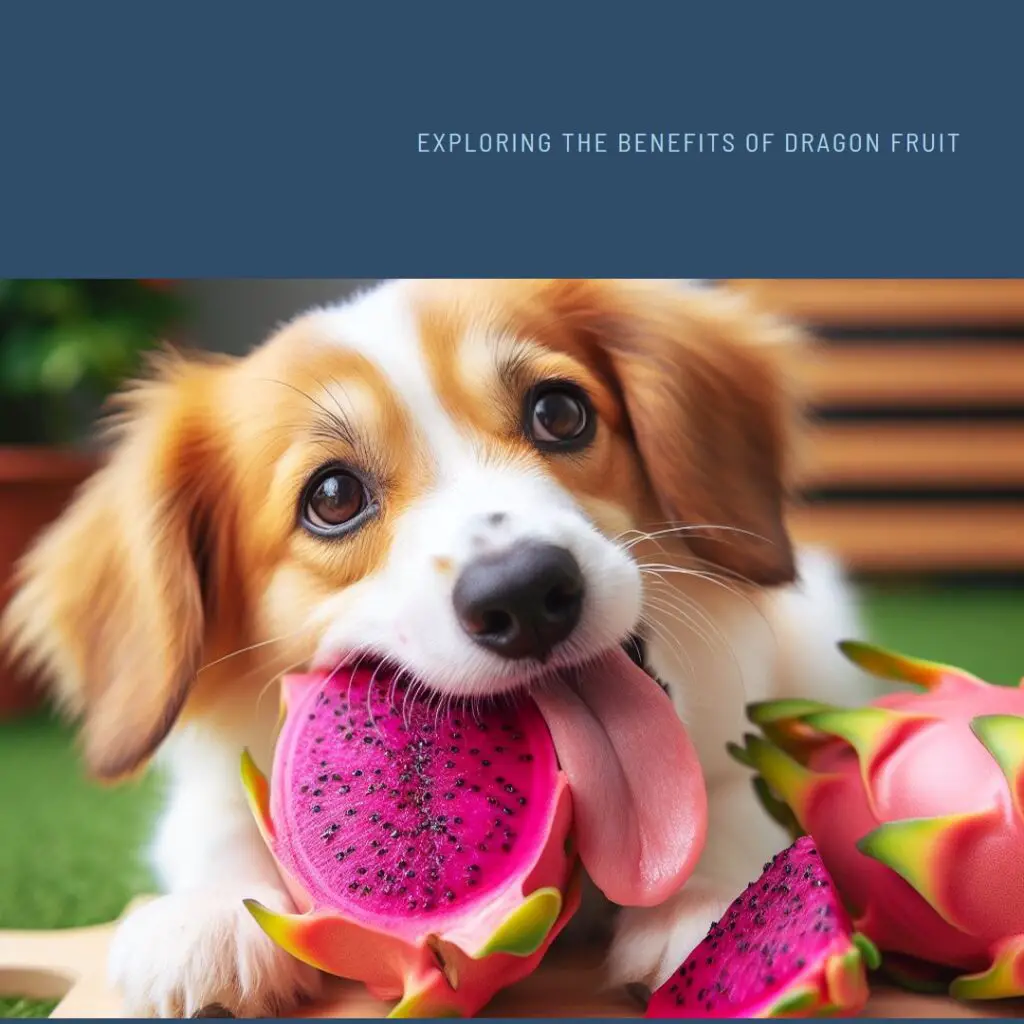Can Dogs Eat Dragon Fruit? Insights for Pet Owners
Many pet owners wonder, “Can dogs eat dragon fruit?” Here’s what you need to know to keep your dog safe and healthy.
- Dogs can safely eat dragon fruit when served properly and in moderation.
- Dragon fruit contains vitamins and minerals that offer numerous health benefits for dogs.
- Remove the spiky skin and seeds before feeding your dog dragon fruit.
- Feeding dragon fruit in excessive amounts can lead to gastric issues, weight gain, poor coat and skin quality, and tooth decay.
- Start with small amounts and monitor your dog’s reaction when introducing dragon fruit to their diet.
Is Dragon Fruit Safe for Dogs?
Yes, Dragon Fruit is safe for dogs. Dog owners can breathe a sigh of relief as dragon fruit is safe for dogs to consume, but there are a few things to keep in mind. This exotic fruit, also known as pitaya, is non-toxic and generally well-tolerated by dogs.
However, it’s important to take precautions to ensure your furry friend’s safety and well-being.

When serving dragon fruit to your dog, it’s essential to remove the spiky skin. The skin can pose a choking hazard or cause digestive issues if ingested. Instead, focus on feeding only the soft flesh of the fruit. Additionally, make sure to eliminate any seeds present in the fruit, as they can also present a choking risk.
Feeding dragon fruit to your dog in excessive amounts should be avoided. While the fruit is packed with essential vitamins and minerals, overconsumption can lead to gastrointestinal problems, weight gain, and dental issues. To ensure a balanced diet, it’s best to offer dragon fruit as an occasional treat rather than a regular part of their daily meals.

| Benefits of Dragon Fruit for Dogs |
|---|
| High in vitamin C, which supports a healthy immune system. |
| Rich in calcium, promoting strong bones and teeth. |
| Contains iron, which aids in the production of red blood cells. |
| Provides essential fatty acids for a shiny coat and healthy skin. |
As with any new food introduction, it’s important to monitor your dog’s reaction to dragon fruit. Start with small servings and observe for any signs of allergic reactions or digestive upset. If your dog exhibits any negative symptoms, discontinue feeding dragon fruit and consult with your veterinarian.
Nutritional Content and Health Benefits of Dragon Fruit for Dogs
Dragon fruit is not just an exotic treat; it also packs a nutritional punch for your furry friend. This vibrant fruit is rich in essential vitamins and minerals that can contribute to your dog’s overall health and well-being.
One of the key health benefits of dragon fruit for dogs is its high vitamin C content. Vitamin C is known for its antioxidant properties, which can help boost the immune system and protect against cellular damage. Additionally, dragon fruit contains calcium, which is important for maintaining healthy bones and teeth, and iron, which is essential for the production of red blood cells.
Furthermore, dragon fruit is a good source of fatty acids, such as omega-3 and omega-6. These fatty acids play a vital role in promoting healthy skin and a shiny coat for your canine companion. They also support brain function and help reduce inflammation in the body.
It’s important to note that while dragon fruit offers several health benefits, it should be served in moderation and prepared correctly. When offering dragon fruit to your dog, always remove the spiky skin, as it can pose a choking hazard or cause digestive issues. Dogs should only consume the flesh of the fruit, avoiding the skin and seeds.
| Nutrients | Amount per 100g |
|---|---|
| Vitamin C | 20.5mg |
| Calcium | 8mg |
| Iron | 0.65mg |
| Fatty Acids | 0.15g |
When introducing dragon fruit to your dog’s diet, start with small amounts and observe their reaction. Some dogs may have sensitivities or allergies to certain fruits, so it’s important to monitor them closely. Additionally, it’s crucial to consider dragon fruit as an occasional treat rather than a regular part of their diet. Excessive consumption can lead to gastric issues, weight gain, and other health problems.
In conclusion, dragon fruit can be a nutritious addition to your dog’s diet when served properly and in moderation. Its abundance of vitamins, minerals, and fatty acids can provide various health benefits. However, always exercise caution, remove the skin and seeds, and consult with your veterinarian if you have any concerns or questions.
How to Serve Dragon Fruit to Your Dog Safely
To ensure your dog’s safety and enjoyment, here’s how to serve dragon fruit without any worries. Start by selecting a ripe dragon fruit that is firm but slightly soft to the touch. Wash the fruit thoroughly to remove any dirt or residue. Next, carefully remove the skin of the dragon fruit using a sharp knife. The skin can be spiky and may pose a choking hazard or cause digestive trouble for your dog, so it’s important to remove it completely.
Once you’ve removed the skin, cut the dragon fruit into small, bite-sized pieces for your dog. Avoid giving them large chunks as it can be difficult for them to chew and digest. It’s also crucial to remove the seeds, as they can be a choking hazard as well. Only feed your dog the flesh of the fruit, as it is safe for consumption and packed with beneficial nutrients.
Introduce dragon fruit to your dog gradually, especially if it’s their first time trying it. Start with a small amount and carefully observe their reaction. Some dogs may have sensitivities or allergies to new foods, so it’s important to monitor them for any signs of discomfort or adverse reactions. If your dog shows any negative symptoms, such as vomiting or diarrhea, discontinue feeding them dragon fruit and consult your veterinarian.
Remember that moderation is key when it comes to feeding dragon fruit to your dog. While dragon fruit is nutritious, feeding excessive amounts can lead to gastric issues, weight gain, poor coat and skin quality, and even tooth decay. Treat dragon fruit as an occasional addition to their regular diet, not as a replacement for balanced meals. By serving dragon fruit to your dog responsibly, you can provide them with a tasty and nutritious treat while ensuring their well-being.
Moderation is Key: How Much Dragon Fruit Can Dogs Eat?
While dragon fruit offers health benefits, it’s crucial to keep moderation in mind to avoid any potential issues for your dog. Dogs can safely consume dragon fruit, but it’s important not to overdo it. Feeding your dog a moderate amount of dragon fruit occasionally is the key to ensuring their well-being.
Excessive consumption of dragon fruit can lead to gastric issues in dogs, such as stomach upset or diarrhea. Additionally, dragon fruit is a fruit that contains natural sugars, so feeding too much of it can contribute to weight gain in dogs. To maintain a healthy weight and avoid obesity-related health problems, it’s important to limit the amount of dragon fruit you give to your furry friend.
The ideal serving size of dragon fruit for dogs depends on their size and weight. As a general guideline, start with a small amount, such as a few small pieces or a teaspoon of mashed flesh, and observe how your dog reacts. If they tolerate it well and show no signs of digestive upset, you can gradually increase the portion size.
Remember, dragon fruit should be offered as an occasional treat rather than a regular part of your dog’s diet. It should not replace their balanced and nutritious meals. Consult with your veterinarian if you have any concerns or questions about adding dragon fruit to your dog’s diet.
| Benefits of Feeding Dragon Fruit to Dogs |
|---|
| Rich in vitamin C, which supports immune system health |
| Contains calcium for strong bones and teeth |
| Provides iron for healthy blood circulation |
| Contains fatty acids that promote healthy skin and coat |
Feeding your dog a moderate amount of dragon fruit occasionally can offer them these health benefits. However, it’s important to ensure that the dragon fruit is properly prepared. Remove the spiky skin and seeds to prevent any choking hazards or digestive issues. Only feed your dog the flesh of the fruit, as the skin and seeds are not suitable for consumption. By following these guidelines and practicing moderation, you can safely introduce dragon fruit as a delightful treat for your furry companion.
Potential Risks and Precautions of Feeding Dragon Fruit to Dogs
While dragon fruit is generally safe for dogs, there are a few risks and precautions to keep in mind. Dogs should only consume the flesh of the fruit and not the skin or seeds. The spiky skin can be a choking hazard and cause digestive trouble if ingested. To ensure the safety of your dog, it is important to remove the skin before serving them dragon fruit.
Additionally, feeding dragon fruit in excessive amounts can lead to various issues in dogs. Overconsumption can result in gastric problems, such as diarrhea or upset stomach. Dogs may also experience weight gain if they regularly consume large quantities of dragon fruit, as the fruit contains natural sugars. It is crucial to remember that moderation is key when offering dragon fruit as a treat to your furry friend.
Moreover, while dragon fruit is packed with essential nutrients, including vitamin C, iron, calcium, and fatty acids, it is not meant to replace a balanced diet for dogs. It should be given as an occasional treat and not as a substitute for their regular meals. Remember to always prioritize a well-rounded diet that fulfills all of your dog’s nutritional needs.
| Risks and Precautions | How to Mitigate |
|---|---|
| Potential choking hazard from the spiky skin | Remove the skin before serving dragon fruit to your dog |
| Gastric issues and upset stomach from overconsumption | Feed dragon fruit in moderation and monitor your dog’s reaction |
| Weight gain and poor coat quality from excessive fruit intake | Offer dragon fruit as an occasional treat, not a regular part of their diet |
By being mindful of these potential risks and taking necessary precautions, you can safely incorporate dragon fruit into your dog’s diet. Remember to always consult with your veterinarian before introducing any new food to your furry friend, especially if they have specific dietary requirements or health conditions. With proper preparation and moderation, dragon fruit can be a delightful and nutritious addition to your dog’s occasional treat menu.
In conclusion, dragon fruit can be a delicious and healthy treat for your dog when given in the right way and in moderation. This exotic fruit, which is cultivated in tropical regions, packs a punch in terms of its nutritional content. It is a low-calorie fruit that is safe for dogs to eat and offers various health benefits.
Dragon fruit is rich in vitamin C, which boosts the immune system and promotes overall wellness in dogs. It also contains iron, calcium, and fatty acids, which contribute to healthy bones, teeth, and skin. These nutrients are essential for your dog’s well-being and can help prevent deficiencies.
However, when serving dragon fruit to your dog, it is crucial to take some precautions. Make sure to remove the spiky skin, as it can pose a choking hazard or cause digestive issues. Dogs should only consume the flesh of the fruit and not the skin or seeds. Additionally, it is essential to give dragon fruit in moderation to avoid potential gastric issues, weight gain, and tooth decay.
As a responsible pet owner, it is recommended to start by offering small amounts of dragon fruit to your dog and monitor their reaction. If your dog enjoys this tropical treat and tolerates it well, you can continue to give them dragon fruit as an occasional addition to their regular diet. Remember, moderation is key, and dragon fruit should not replace their balanced and nutritious meals.
FAQ
Can dogs safely eat dragon fruit?
Yes, dogs can safely eat dragon fruit as long as it is served properly and in moderation.
What are the nutritional benefits of dragon fruit for dogs?
Dragon fruit is rich in vitamins and minerals such as vitamin C, iron, calcium, and fatty acids, which offer numerous health benefits for dogs.
Should I remove the skin and seeds before feeding dragon fruit to my dog?
Yes, it’s important to remove the skin and seeds of dragon fruit, as they can present choking hazards or digestive trouble for dogs. Only the flesh of the fruit should be consumed.
How much dragon fruit can dogs eat?
Dogs should consume dragon fruit in moderation. Feeding excessive amounts can lead to gastric issues, weight gain, poor coat and skin quality, and tooth decay.
Is dragon fruit safe for all dogs?
Dragon fruit is generally safe for dogs, but individual dogs may have different sensitivities or allergies. It is recommended to start with small amounts and monitor their reaction.
Can dragon fruit be a regular part of a dog’s diet?
Dragon fruit should be given as an occasional treat and not a replacement for a dog’s regular diet. It should be offered in moderation alongside their balanced and nutritious meals.
Are there any risks or precautions when feeding dragon fruit to dogs?
While dragon fruit is generally safe, feeding excessive amounts or the wrong parts of the fruit can pose risks. It’s important to be aware of these risks and take necessary precautions.
Is it safe for dogs to eat dragon fruit?
Yes, Dragon fruit is safe for dogs to consume in moderation. However, it is important to remove the skin, seeds, and any other potential choking hazards before feeding it to your furry friend.
Are there any health benefits for dogs in eating dragon fruit?
Yes, there are several potential health benefits for dogs in consuming dragon fruit, such as BASICLIST. It is packed with essential vitamins and minerals and can serve as a hydrating treat due to its high water content.
Can dogs eat other types of dragon fruits, like yellow or red dragon fruit?
Yes, dogs can eat various types of dragon fruits, including yellow and red dragon fruit. The general guidelines for feeding dragon fruit to your dog apply to all varieties. However, remember to remove the skin and seeds before offering it to your pet.
How much dragon fruit can I feed my dog?
You should only feed your dog dragon fruit in moderation. The recommended serving size is up to 3.5 ounces of dragon fruit per day, depending on your dog’s size and individual dietary needs.
How can I safely feed dragon fruit to my dog?
To safely feed dragon fruit to your dog, EXTENDEDLIST. It’s crucial to ensure that your dog eats only the flesh of the fruit and avoids the skin, seeds, and any other potential hazards.
Is it necessary to introduce dragon fruit slowly into my dog’s diet?
It’s generally a good idea to introduce any new food slowly into your dog’s diet, including dragon fruit. Start with small portions and monitor your dog’s reaction to ensure they tolerate it well.
Can dogs eat dragon fruit seeds?
No, dogs should not consume dragon fruit seeds. The seeds can pose a choking hazard and may cause digestive issues if ingested. Always remove the seeds before offering dragon fruit to your dog.
Can I give dragon fruit to my dog daily?
While dragon fruit can be included as an occasional treat or addition to your dog’s diet, it is not necessary or recommended to feed it to your dog daily. Moderation is key to maintaining a balanced diet.
Source Links
- https://upperpawside.com/dogs-and-fruit/can-dogs-eat-dragon-fruit/
- https://topdogtips.com/can-dogs-eat-dragon-fruit/
- https://medium.com/@athifhussain22/can-dogs-eat-dragon-fruit-94d667a0734
- Are Antlers Safe For Dogs? - January 14, 2024
- Can Dogs Eat Honey Nut Cheerios? - December 23, 2023
- Natural Deworming Remedies for Your Dog - December 18, 2023








